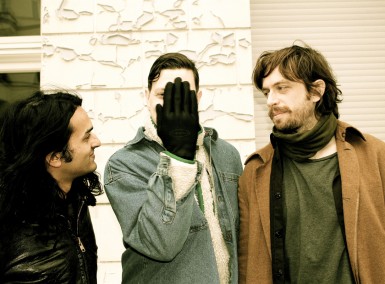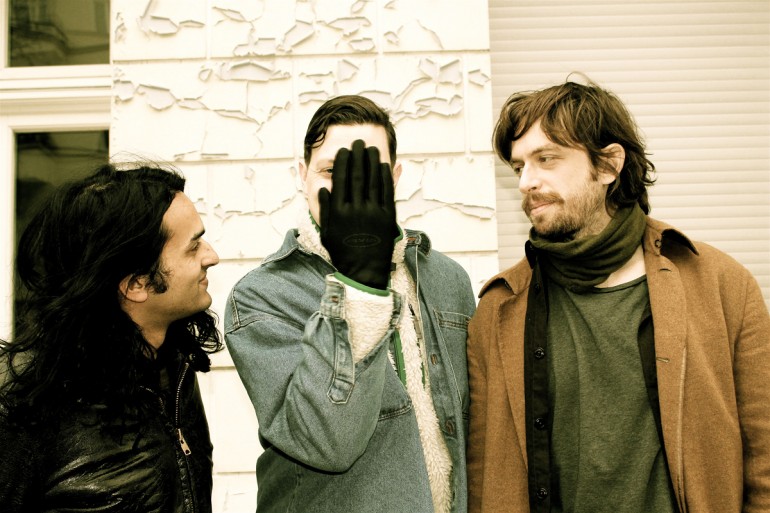
Yeasayer by Annett Bonkowski for NBHAP.com
YEASAYER’s uncanny ability to engage their audience with ravenously complex, intelligent work has only grown over the course of their 10-year lifespan as a band. Now, with their fourth studio album, Amen & Goodbye, the transcendental pop futurists have completed a work which echoes all parts of musical and human history, which still, somehow, ends up pretty much sounding like the future.
NOTHING BUT HOPE AND PASSION editor Paul Thomas sat down with the band’s Anand Wilder for tea on a snowy Winter day in Berlin to try to get a clue about the underpinnings of just how a YEASAYER album comes together, what ideas it is important for them to communicate as well as all the elements which made their latest undertaking markedly different (and often trickier) than anything they had attempted in the past.
In all of your albums there is almost an apocalyptic undertone, and with this one being called Amen & Goodbye does it imply something like that or is it hinting more towards a certain amount of closure on a particular phase or creative period of your lives?
Anand Wilder : Well, it is whatever people want to read into it, but I think it is more of a succinct way of relating to the religious overtones, critiques and polemics that are on the album. Also, it was a VERY long process for us, so it is sort of silly in that way, it was like: OK, and: we’re done! AMEN! Every piece of art that you put out into the world – you have labored over it for so long that you’re just like: ‘OK, so long! You’re out there!’
The album imagery, your plaster avatars…there’s a lot going on there. Had to seek out the highest res version possible to try to take it all in…
You gotta get the gatefold!
You guys have crystals in your heads.
Yea, the artist is David Altmejd – that is just his style. If you look into he does a lot of multimedia in his sculptures. That was the great thing about going to his studio, it was really like Willy Wonka’s Chocolate Factory. In the cover image there are a couple of digital pieces but most of it is made out of the material called magic sculpt which is a very contemporary clay. Just watching him do the watermelon – he knows exactly which substance and how the substance should be pouring – how it should drip down, even though it is going to be solid, but it will still pour and harden really quickly – so that is always exciting for us because we’re such geeks about the process – whether it is music-making or art-making, it is so much more interesting to me than any kind of ‘meaning’ or…
Photoshoppedness?
For sure. Well, he knows: this is the tool you need and you need this tool to cut through this!
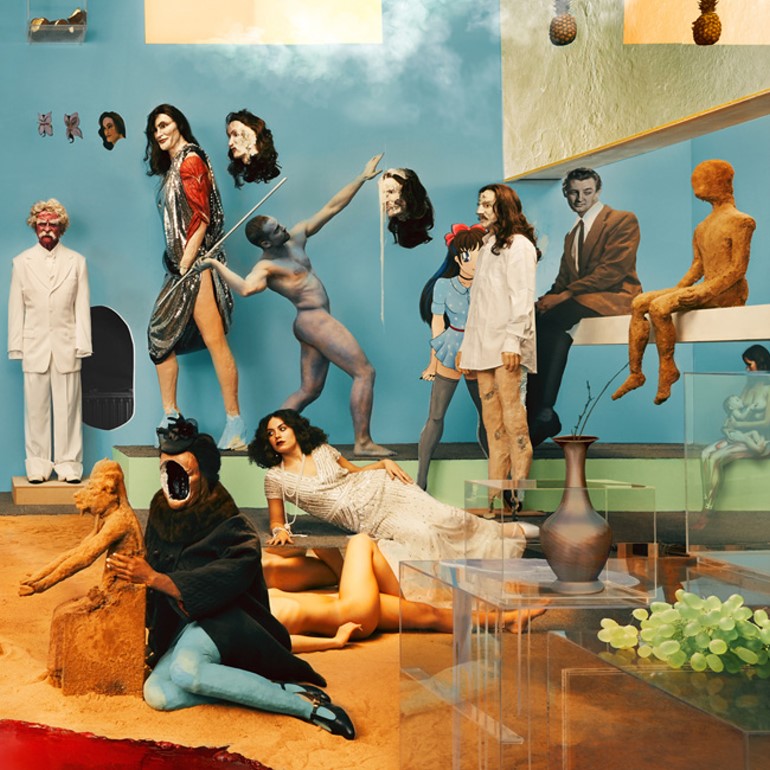
The impressive artwork of ‘Amen & Goodbye’
In the same way that you guys have got your crazy instruments? This time around the aesthetic of the album is more analog or alchemical in comparison to the perhaps sleeker, more futuristic look of the past visuals – was that something that came after the fact or did you have that in the works all long?
With this one we were trying to do less of an electronic, cold record – not that the last one doesn’t have its moments of joy or bubbliness, but overall it was a more icey affair. With this one we were trying to embrace the kind of antiquated tropes of an album- so really thinking about album order, about making a dynamic pop or classic or rock album. You know, you’ve got your up-tempo rocker and your somber ballad and that kind of thing. The challenge was to see how much we could incorporate live with acoustic, mic-ed up elements and still have them sound novel and weird.
It seems like with the water damage situation you guys lost a ton of work?
It wasn’t that big of a deal. I mean, it was a big deal but it was also an impetus to go in a different direction. It made us go back to the realization that we need to record on many different mediums – so that was a learning experience. It wasn’t the end of the world. Mute, the record label, wanted us to work with a producer and we were given a short list. Joey Waronker (BECK, R.E.M.) was on there so we took this bad situation and said: ok, maybe this guy Joey will be good because we don’t have a drummer in the core of the band.
A Dialogue Between Analogue and Digital
It seems like you guys take turns with everything.
Indeed, so upstate – where the initial recordings took place – a lot of the rhythmic beds were created just by us hitting things and being more open to hits being not perfect. Chris had a Tempest he had borrowed from someone else in the studio and he was just learning it so he was making all these naive mistakes and trying to flip the beat and we were all trying to impress Joey, but Joey just set up this minimal drumkit, like this wooden box that had little jangles in it and a tiny little cymbal that made a huge sound and a Brasilian percussion instrument called a rico rico – kind of like a spring that you scrape against. We would just play along with our songs and he’d say: ‘Oh, measure 33-37, that was pretty good!’ When we’d play it back it was always pretty good.
It could be kind of chaotic, but if I had written it down it was good and Joey would say ‘what is that?’ And we’d say: ‘that’s what you just played!’ That happened a LOT. I mean, that kind of portrays him as a bit of a savant, but he was just a very natural player. He didn’t really know much about programming or synthesizers and sometimes we would do things like in Dead Sea Scrolls we were in the habit of chopping them ups, and he was like: that’s a little crazy, we can’t do that. But if you just listen to it then it sounds perfectly normal.
We did a lot of stuff with tape loops and emulating tape loops so there was this kind of dialogue between the analogue and digital world, which is kind of something we have done all along – the whole time. We’ve got to make it sonically interesting.
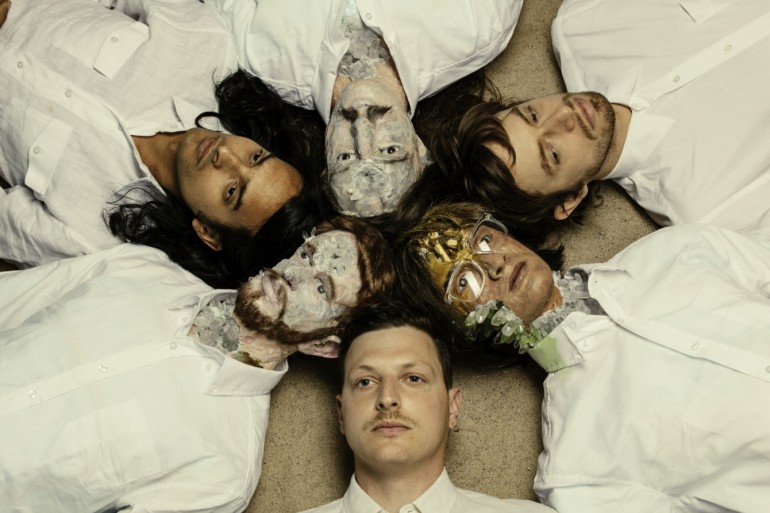
Yesayer – Photo by Eliot Lee Haze
With this album how will that ultimately affect the live show?
We’re trying to get away from the handsonic drum – it is sort of like a live drum machine. You hit it with real sticks, and although that is a really simple way to play these sounds you’ve recorded – you can put in any sample – there’s this guy who is actually making this amazing new drum program where you hit a regular snare and it has a trigger set up to it and it just learns everything about the way you are hitting it, so you have a loud hit or an edge of the drum sound hit, and under the side stick and that can translate into any sound you want and anything in between them – it would be much more dynamic than just hitting that one.
And it is doing that live?
It is a live program, yea. He is hand-making them all right now and we’re 12th in line to get one. It would be great to be able to incorporate that kind of thing, but I have also just been going on a manic spending spree calling Joey and asking: ‘Joey! What are the things I need to get?! Trash cymbal? Ok!’ I got this thing called a ribbon crasher – it is sort of like three pieces of sheet metal screwed together and it sounds like you are banging some forks together and that is the sound from one of our songs. We’re actually going to be working with a new drummer for the tour.
You guys all have families now, right? Has some of that filtered into the new album? Sounds like there is a song to someone’s daughter?
(laughs) Yes, although the mixing engineer only figured it out once I was on the phone with my daughter – he just thought it was a love song to a really whiney girlfriend.
Pretty high maintenance, huh?
I thought: awh, shoot, I should have made it more universal! (laughs) But I think mixing engineers aren’t paying attention to the lyrics that much.
Regarding lyrics, if I wouldn’t have read them on some of the tracks I might have been permanently off the mark – especially I Am Chemistry – a song that was going to be from the perspective of a molecule? But it turned out to be more about chemicals being poison in our lives? I imagined if I looked up every line of that song there’d be something interesting to find…
You reverse engineered the song.
Well, those words and chemical terms just aren’t ones your brain is used to encountering, for example I mistook ‘oleander’ for ‘old Leander’ and tried to make a connection to a Greek myth – which, for a YEASAYER song, might be just as likely, but having those lyrics was extremely helpful since there is definitely some decoding to be done – ‘blonde escatology?’ But that is fine, you guys as a band – you’ve never been a straight-up pop group – and again on this album, you give your listeners something to figure out.
That’s good! I think that is what we were trying to do: to make things a bit more easily digestible on the surface-level than the last album.
Digestible like ‘accessible’?
Accessible, yes, and even though it is still strange it is maybe nostalgic in a way that people are more used to than the last record that was maybe a bit more futuristic, but then to also be open to using strange words – which really describe exactly what we were talking about. That Prophecy’s Gun song was really a polemic that tied into the theme of the album: toying with our own kind of religious manifesto.
Music as spiritual outburst instead of religion
Right. That came up. Even in our popular Western culture if you even mention religion then you open up a can of worms. So you guys were approaching an album with that as some of your base material?
Well, I think we were referencing it in the same way that someone who is writing an article on, for example: Is the ‘Islamic State’ Islamic? You know? That person is writing about that, it isn’t like we are writing based on our faith in it. It is more: this is our secular critique of the subject matter which we are constantly bombarded with in 2016.
Just as a member of society?
Yea, this is our platform. I don’t want to preach falsehoods to people. I want to be a bit of a poet or whatever, and make people think about things. I am a secular, atheist guy raising a family – what does that mean today? What kind of values do I want to pass down to my kid? How do I get annoyed by people knocking on my door trying to convert me to Seventh Day Adventism? In that way, I think our first album actually – we were a bit more vague with it and took some religious imagery and I think people who had a lot of faith were drawn to…
Really? Did some people show up to your shows and were like…
Well, they were onto us. We played some Christian Colleges and stuff…
Well, you all did have really long hair at the time…
Yeaaa. (laughs) For me being an atheist who doesn’t really have a church or anything the music is kind of the spiritual outburst, you know?
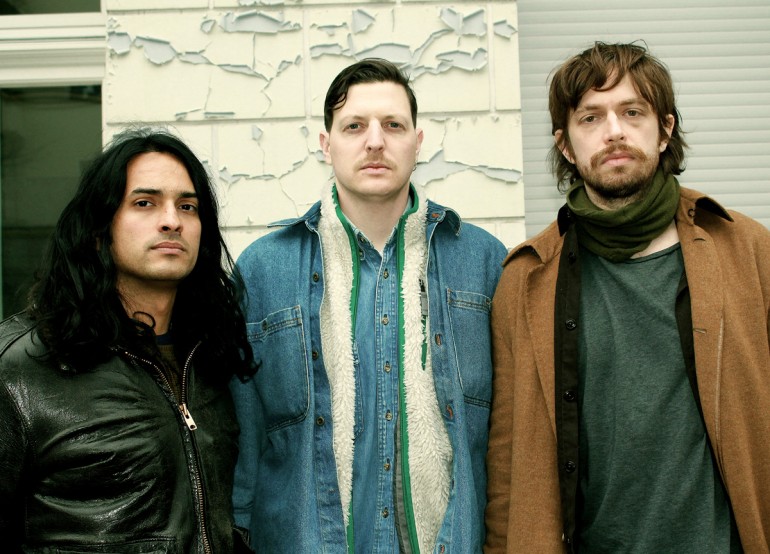
Yeasayer by Annett Bonkowski for NBHAP
You guys have been in New York City for awhile now. I find that even in Berlin, a lot of the live music shows I have seen over the years have been NYC-based bands. How has that scene – if you can call it a ‘scene’, it is obviously a big city – but how has that ‘scene’ enabled you over time? In terms of being in that place, amongst that community?
You know, it is hard to say. I don’t know anything else. So, I don’t know what is ‘normal’ and what is fully based on being in New York. It’s not as if I have met all the amazing contemporaries of mine who would be living in New York. I have met them through touring. We met the guys from TAME IMPALA because they opened up for us in Sydney when they were 19. So maybe we are on a faster track of whatever notoriety we have because of the proximity to New York City and the fact that we were able to play so many shows and to be a part of this Brooklyn Zeitgeist.
But other than that I feel like just being in a band you become part of this funny international community.
I think the beauty of New York – and you realized it as soon as you travel 30 minutes West and go to New Jersey – is that even if you are not seeking it out, you are still absorbing this, it is still a cultural hotbed. You are still hearing about things that people in New Jersey don’t. Not to talk shit about New Jersey, but…I grew up in Baltimore, and I really loved it, but yea… I remember coming back and playing a festival after being away for so many years and realizing that these kind of provincial customs and fashion senses that I thought were something from the 90s were actually regional, you know?
Like their own little bubble?
Yea. I am so glad I got outta there and I am so glad that my daughter is going to grow up in one of the most diverse cities in the world. Already at the age of three-and-a-half she has tried food that originated in more regions of the world than I did by the time I was 26! I mean, my mom made Indian food and we had the one Chinese restaurant we’d go to twice a year…maybe it is different now, but I don’t think so. If you live in New York it is just so diverse. It is… it is insane how diverse it is! No other place is like that except maybe London or LA or something.
What do hope and passion meant to you?
Without hope and passion life is pretty dull. A lot of times I look around and wonder how people can maintain hope and passion in their boring lives. (laughs) I mean, for me I have the constant hope that I can create an amazing song or something that will connect with people worldwide. On a personal level I hope that I can just complete the song and write something new – that just gives me so much joy – and that is what I am passionate about. I’m pretty passionate about raising my daughter. I hope that her life is…but most of the time I am just too tired to be that passionate about it.
—



